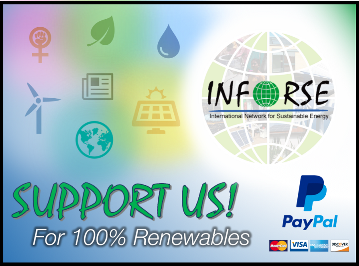|
|
|
|
|
|
|
|
|
|
|
|
|
|
|
|
|
|
|
|
|
| Follow Us: |
| Expert Group Has to Improve | |
| By Michael Kvetny, INFORSE observer at the first session in the UN Group of Experts on Energy and Sustainable Development in New York City. | |
|
What was meant to be a debate between experts on key issues of energy and social development turned out to be a brainstorm with no focus and no strategic considerations. The Ad Hoc Open-ended Intergovernmental Group of Experts on Energy and Sustainable Development met for its first session March 6-10, 2000, in New York City with 33 national representatives, mainly from the North, plus observers. At this session, the energy experts prepared for the 9th session of the UN Commission on Sustainable Development (CSD9), to be held in 2001. The preparatory process started in 1997 with the decision at a UN General Assembly Special Session 5 years after the Rio meeting (UNGASS) to include energy as an issue in the programme for the further implementation of Agenda 21. Then, national governments and others were asked for inputs to the process. Based on the comments, the secretary-general prepared a report for the group of experts. This report and the World Energy Assessment prepared by the UNDP in co-operation with the World Energy Council formed the basis for discussions at the meeting. Disappointment The report, launched in January of this year, was a great disappointment from a sustainable-energy perspective. All issues related to energy were included in the debate with no priority and no discussions of objectives. The group of experts identified the following key issues: • Accessibility of energy • Energy efficiency • Renewable energy • Advanced fossil-fuel technologies • Nuclear energy technologies • Rural energy • Energy and transportation • Technology transfer • Capacity-building • Mobilisation of financial resources • International and regional co-operation The session showed no consensus among the EU countries to take the lead for sustainable development. The G77 countries and China wanted all doors to be open for technology transfer, without criteria for sustainability. The most intense discussions were about the election of co-chairs. When elected, the co-chairs (Irene Freudeschuss-Reichl from Austria and Mohammad Reza Salamat from Iran) chose a defensive role. Other disappointing points were the efforts from Canada and other countries to include nuclear power and the lack of interest from the G77 countries, headed by Nigeria, to address the problems of subsidies for fossil fuels. The result of the meeting (including the above-mentioned list of key issues) was only a “working paper for consideration”. The only agreement reached was on a Provisional Agenda for the Second Session, to held in March 2001, one month before CSD9. The main points of this agenda will be: • Considerations of the key issues of energy for sustainable development and the means of their implementation, i.e., capacity-building, technology transfer, and financial resources: • Regional Initiatives and Endeavours • Enhancing International Cooperation for Energy for Sustainable Development • Learning from each other: Success Stories in the Promotion of Energy for Sustainable Development • Adoption of the report to CSD9. Islands as Sole Movers The Association of Small Island States (AOSIS) and their representative, ambassador Slade from Samoa, used the meeting to present the initiative for sustainable energy for islands taken at the Global Conference on Renewable Energy Islands, September 1999, Ærø, Denmark. This was a little step forward at a disappointing meeting. The NGOs in the “CSD Energy Caucus” recommended that the expert group focus on some main themes: real cost of energy without subsidies; environmental, social and health costs of energy; energy conservation; renewable energy; and financing strategies for sustainable energy. This recommendation was not reflected in the discussions or in the outcome of the meeting. NGOs Must Push for Action NGO’s cannot wait for further discussions in 2001, but have to do something to keep up the momentum from UNGASS concerning energy for sustainable development. The NGO society must push national governments to take the preparation process for CSD9 seriously. INFORSE supports the “Windforce 10” campaign which shows that wind energy can cover 10% of the world‘s electricity consumption by the year 2020. Soon, a scenario showing that 50% of the world energy consumption can be covered by renewable energy by the year 2050 will follow this initiative. Photo: INFORSE was observer at the United Nations Photo by Scott Murphy, New York City Information: www.un.org/esa/sustdev/enrexpert.htm (official reports); www.igc.org/csdngo/energy/ene_index.htm (NGO reports). ******* |
|

| |
| Published in Sustainable Energy News |
|
|
Go back to main page of ISSUE #29 (684KB) 16 pages (2000-05-01) |
|
| Contact | |
| |
INFORSE Secretariat Klosterport 4F, 1. floor DK-8000 Aarhus C Denmark Phone: +45 86 22 70 00 Twitter: INFORSE_org Facebook: INFORSE Web: inforse.org E-mail: ove@inforse.org |
